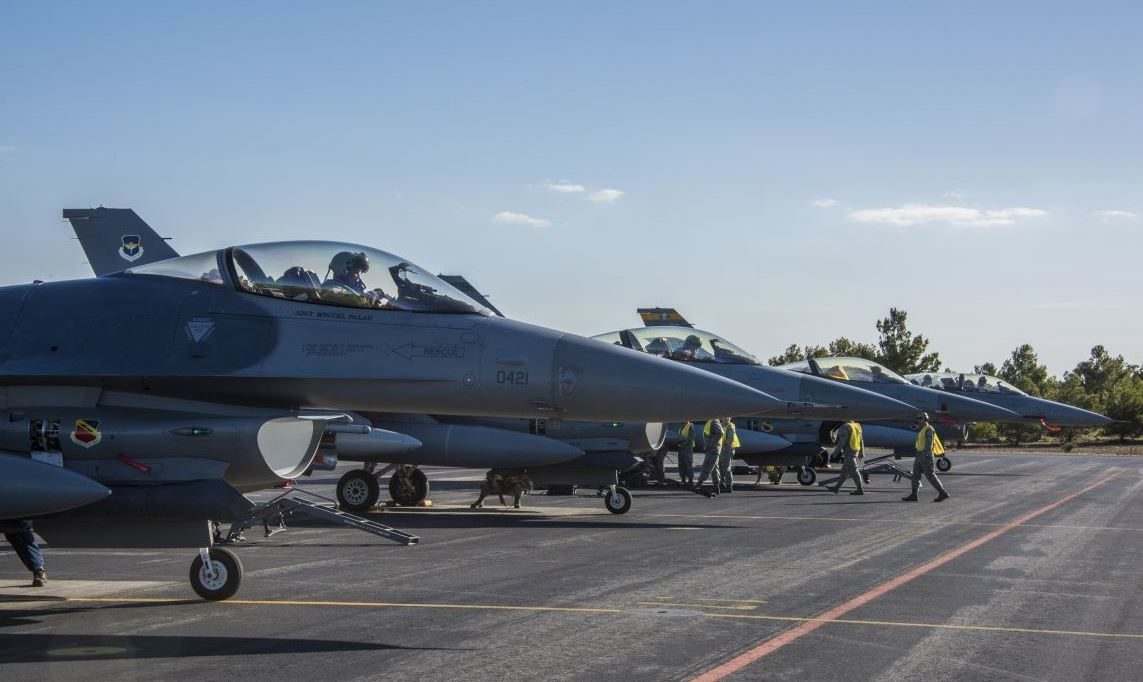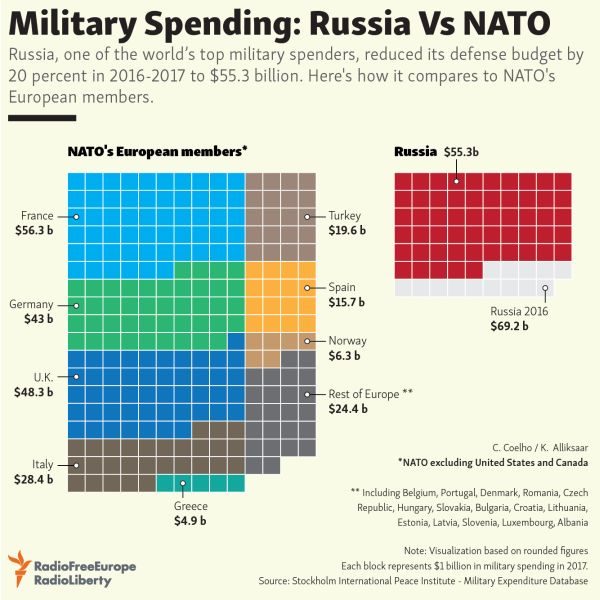Selv Radio Free Europe, den amerikanske regerings anti-Russiske nyhedstation, registrerede, at Rusland havde reduceret dets forsvarsudgifter.
Der er påviseligt ikke nogen trussel overhovedet til noget NATO land fra Rusland, men dette er betragtet som irrelevant i sammenhængen med amerikanske våbensalg, som florerer og er blevet tilskyndet til at øges og fordobles.
Den 12. juli på den anden og sidste dag af det seneste møde mellem USA og NATO, så rapporterede Reuters Trump at sige at "USA laver langt det bedste militærudstyr i verden, de bedste jagerfly, de bedste missiler, de bedste rifler, de bedste af alt." Han gik videre med "at opremse de top amerikanske våbenproducenter, Lockheed Martin Corp, Boeing Co og Northrop Grumman Corp ved navn."
Kommentar: Denne artikel er delvis oversat til dansk af Sott.net fra: NATO is a goldmine for US military industrial complex
Kristeligt Dagblad havde i 2006 en artikel Det militærindustrielle kompleks -- fjenden indefra hvor journalisten Jesper Pedersen dengang afsluttede med at sige:
"Hvorefter det er naturligt at stille 10.000 milliarder kroner-spørgsmålet: Hvem eller måske rettere hvad er i virkeligheden fredens hovedfjende: Osama bin Laden - eller det militærindustrielle kompleks."
On July 11 the Nasdaq Stock Exchange listed the stock price of Lockheed Martin at $305.68. The day after Trump's speech, it increased to $318.37.
On July 11 the Nasdaq Stock Exchange listed the stock price of Boeing at $340.50. The day after Trump's speech, it increased to $350.79.
On July 11 the New York Stock Exchange listed the stock price of Northrop Grumman (it doesn't appear on Nasdaq) at $311.71. The day after Trump's speech, it increased to $321.73.
General Dynamics, another major US weapons producer, might not be too pleased, however, because its stock price rose only slightly, from $191.51 to $192.74. Nor might Raytheon, the maker of the Patriot missile system which Washington is selling all over the world, because its stock went up by a modest five dollars, from $194.03 to $199.75. Perhaps they will be named by Trump the next time he makes a speech telling his country's bemused allies to buy US weapons.
Trump also declared that "We have many wealthy countries with us today [July 12 at the NATO Conference] but we have some that aren't so wealthy and they did ask me if they could buy the military equipment, and could I help them out, and we will help them out a little bit," which made it clear that poorer countries that want to buy American weapons will probably not have to put cash down for their purchases. So it wasn't altogether surprising that the stock prices of the three arms manufacturers named by Trump all rose by over ten dollars.
To further boost this bonanza, the State Department did its best to make US arms sales even easier by enabling weapons manufacturers to avoid the well-constructed checks and balances that had been in place to ensure that at least a few legal, moral and economic constraints would be observed when various disreputable regimes queued up to buy American weapons.
But these regulations no longer apply, because on July 13 the State Department announced new measures to "fast-track government approval of proposals from defense and aerospace companies" which action was warmly welcomed by the President of the US Chamber of Commerce Defence and Aerospace Export Council, Keith Webster, who is "looking forward to continued collaboration with the White House on initiatives that further expand international opportunities for the defense and aerospace industries."
There was yet more boosting by Lt-General Charles Hooper, Director of the Defense Security Cooperation Agency, who declared at the Farnborough International Air Show on July 18 that "Defense exports are good for our national security, they're good for our foreign policy. And they're good for our economic security." He then proposed that his agency cut the transportation fee charged to foreign military sales clients, which would be a major stimulant for sales of "the best jets, the best missiles, the best guns" so valued by Mr Trump. Obviously a devoted follower of his President, the General followed the Trump line with dedication by reminding the media that "as the administration and our leadership has said, economic security is national security." This man just might go places in Trump World.
But he won't go as far as the arms manufacturers, whose future growth and profits are assured under Trump and the Washington Deep State, which is defined as "military, intelligence and government officials who try to secretly manipulate government policy." US weapons producers have realised, as said so presciently two thousand years ago by the Roman statesman, Cicero, that "the sinews of war are infinite money," and their contentment will continue to grow in synchrony with their financial dividends.
Voice of America joined the chorus of reportage on July 12 and observed that "with Thursday's renewed pledge by NATO countries to meet defense spending goals, some of the biggest beneficiaries could be US weapons manufacturers, which annually already export billions of dollars worth of arms across the globe."
Within European NATO, the biggest spenders on US arms, thus far, are Poland, Romania, Britain and Greece, and the amounts involved are colossal. Poland, whose economy is booming, has signed an agreement to buy Patriot missile systems for $4.75 billion, adding to the purchase of Joint Air-to-Surface Standoff Missiles for $200 million, Advanced Medium Range Air-to-Air Missiles, costing $250 million, and High Mobility Artillery Rocket Systems for the same amount. Delivery of its 48 F-16 multi-role strike aircraft ($4.7 billion) began in 2006, and Warsaw has proved a loyal customer ever since. Who knows what exotic new piece of US hardware will be ordered as a result of Mr Trump's encouragement?
Romania, a country with only 750 kilometres of motorway (tiny Belgium has 1,700 km), has been seeking World Bank assistance for its road projects but is unlikely to benefit because it is so gravely corrupt. This has not stopped it purchasing US artillery rocket systems for $1.25 billion and Patriot missiles for a colossal $3.9 billion, following-on from construction in May 2016 of a US Aegis missile station, at Washington's expense. It forms part of the US-NATO encirclement of Russia, and its missiles are to be operational this year.
The message for European NATO is that the US is pulling out all stops to sell weapons, and that although, for example, "about 84% of the UK's total arms imports come from the United States", there is room for improvement. Slovakia is buying $150 millions' worth of helicopters and paying a satisfying $2.91 billion for F-16 fighters, but other NATO countries appear to have been less disposed to purchase more of "the best jets, the best missiles, the best guns" that Mr Trump has on offer.
The mine of NATO gold is there for exploitation, and following Trump's enthusiastic encouragement of his arms' manufacturers it seems that extraction will be effective. The US Military-Industrial Complex stands to gain handsomely from its President's campaign to boost the quantities of weapons in the world.





Kommentar: Begs the question, how many of those fancy new weapons will end up in the hands of terrorists?